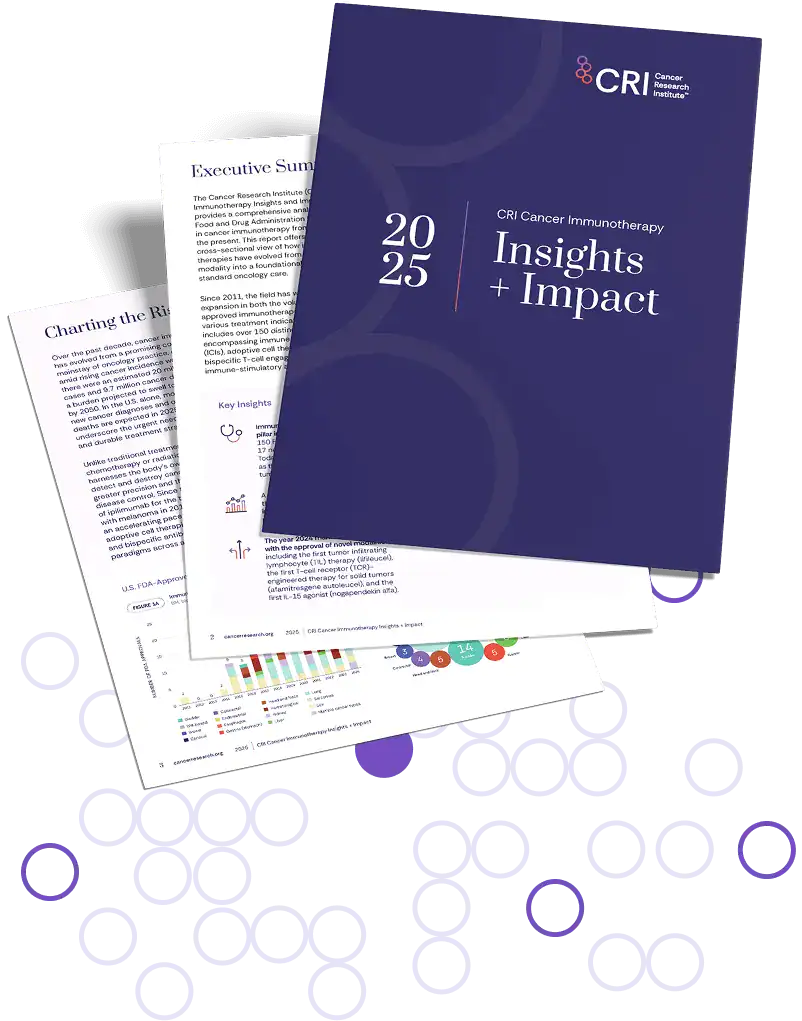CRI Clinic & Laboratory Integration Program

Accelerating the Translation of Immunological Discoveries into Cancer Therapies
Program Overview
The CRI Clinic and Laboratory Integration Program (CLIP) supports innovative investigations at the intersection of laboratory discovery and clinical application in cancer immunology.
Focus and Scope
New and effective cancer treatments require more than laboratory breakthroughs–they require translational pathways that bring bench discoveries into patient trials and return clinical insights to the lab. The CRI CLIP program supports this vital bidirectional flow by funding research that:
- Applies Basic Science: Leverages basic immunological knowledge to solve clinical problems
- Advances Therapeutics: Translates preclinical findings into therapeutic strategies
- Informs Discovery: Uses clinical observations to inform fundamental immunology
- Improves Translation: Builds models that improve immunotherapy testing and delivery
Additional Opportunities
In partnership with the Chordoma Foundation (CF), CRI also invites LOIs focused on accelerating the development of effective treatments and ultimately a cure for chordoma, a rare type of cancer that occurs in the bones of the skull base and spine. Please be advised that CF has chordoma models and banked tumor samples (including a new TMA consisting of 95 chordoma specimens) that are available to the research community. Successful applications in this area will be co-funded by CRI and CF.
Overview
CLIP grants are awarded to investigators whose work has direct clinical relevance and a clear line of sight to patient benefit–whether through improved response prediction, novel therapeutic design, biomarker discovery, or elucidation of resistance mechanisms.
Financial Support
CLIP grants provide $300,000 over 2 years to qualified investigators pursuing high-impact research that directly informs or emerges from clinical practice. By fostering tight integration between the lab and the clinic, CLIP aims to accelerate the development of next-generation immunotherapies and optimize their application for patients with cancer.
To further advance promising projects, CLIP Investigators may apply for a second round of support–an additional $300,000 over 2 years–during the second year of their initial award. This extension is available to projects that demonstrate exceptional progress and generate outstanding data, ensuring that the most impactful research can continue to move forward.
Institutions will be provided indirect costs of up to 10% of the total amount awarded. Indirects are provided in addition to awarded funds.
Deadlines
The process for applying for a CRI CLIP Grant consists of two parts:
- Letter of Intent
- Invited Application
The deadline for the receipt of the Letter of Intent is December 1. Candidates will be notified by the end of January whether they have been invited to submit a full grant proposal. The full application is due March 1. If these deadlines fall on the weekend, applications will be accepted the following Monday. Applications are due by 5 p.m. Eastern Time on these dates. The earliest an award can activate is July 1. Awards activate on the first of the month.
Eligibility
Candidates for a CRI CLIP Grant must hold a faculty appointment as a tenure-track assistant professor (or higher rank) at the time of award activation. If not, documentation from their institution must accompany the Letter of Intent indicating they will hold the position of assistant professor (or higher rank) by the time of award activation. CRI has no citizenship restrictions, and research supported by the award may be conducted at medical schools and research centers in the United States or abroad. Please note that CRI CLIP Grants do not support research at for-profit institutions.
Instructions for Applying
Letters of intent must be submitted electronically. Once you access the application, you will be asked to create a user account unique to you, which will catalogue all applications you submit to CRI. If you have submitted a grant application to CRI in the past, please login with your existing user account.
Supporting Materials
After you have filled out all required fields on the online form, you will be asked to upload the following four items as individual PDF documents:
- An initial research concept (succinct description of the proposed research, description of the relevance of the proposed research to cancer immunology, description of how your proposed project bridges laboratory and clinical discovery), not to exceed 3 pages.
- Brief description of your current research.
- Curriculum vitae and bibliography (limit bibliography to past 5 years or publications relevant to proposed research).
Notes:
- Applications exceeding stated page limits will be disqualified.
- Only PDF documents will be accepted. All files must be submitted individually on the attachments page of the online application.
- When you have finished uploading the attachments, click “Submit.” You will receive a notice confirming that you have successfully submitted your Application Form. Immediately after, an automated notification from CRI will be sent to your email address, also confirming submission. If you encounter problems uploading your attachments, email them to [email protected]. Be sure to note the application number, which will be assigned to you at the time of submission.
- Online applications will be accepted until 5 p.m. Eastern Time on the deadline date. If the deadline falls on the weekend, applications will be accepted until the close of business that following Monday. We strongly suggest submitting your applications as early as possible to provide ample time in case your application is incomplete. Incomplete applications will not be considered.
- Formatting Guidelines: Any documents you attach to your online application form must be typed single-space using a 12 point or larger font size.
Award Terms and Conditions
All awardees must adhere to the terms of this award.
Please note: The Cancer Research Institute will not modify the terms of its policies at the request of individual institutions. Policies have been approved by our Board of Trustees, and we do not have the resources to negotiate separately with the many institutions that receive our support.
Application Deadline
Letter of Intent
December 1
Invited Full Application
March 1
(If a deadline falls on the weekend, applications are due the following Monday.)
Application Resources
What’s Next in Immunotherapy?
Read CRI’s 2025 Cancer Immunotherapy Insights + Impact Report
